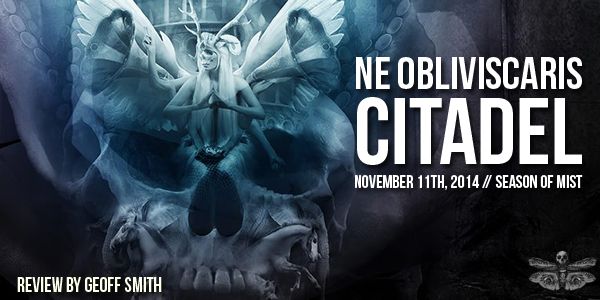
Over recent years, we have seen a growing abundance of bands playing and writing in a so-called ‘progressive’ way; that is, drawing on a broad range of non-traditional influences as a basis for the development of more and more sophisticated means of interpreting the fundamentals of their root genre. However, while this intrepid and fearless exploration into the extremes of composition and technique is one of the more exciting and attractive things about modern metal, very few progressive bands are truly innovative, or introduce something entirely new into the mix. Ne Obliviscaris is one such band who, with their critically acclaimed debut album, Portal of I, eschewed the long accepted conventions of instrumentation by flirting with the notion of a violin lead in an extreme metal context, and did so with seamless effect. Nearly three years on, and the band have returned with Citadel, an album which not only showcases the devastating potential of the lead violin, but cements Ne Obliviscaris as one of the very best up and coming progressive metal bands in the world today.
Of course, Portal of I was not merely memorable for its incorporation of the violin, but was in its own right a musically engrossing and emotionally engaging journey through 72 epic minutes of progressive black metal, and was this writer’s choice as the best album of 2012. However, while the atmospheric quality of Portal of I, its patient build ups and its preparedness to embrace stillness were some of its highlights, one criticism that could be levelled at it – and this is nit picking – is that on reflection, the songs perhaps had a tendency to at times lose focus, and to both labour through prolonged sequences of blast beating, and meander somewhat through their more repetitive sections.
By comparison, Citadel is a much more streamlined work, and is a model of efficient and purposeful composition; each section capturing the intended mood with startling immediacy, and never lingering long enough to become at all stale. For this reason, Citadel is an almost instantly accessible listen. However, even though it is 23 minutes shorter than Portal of I, it also has the sense of being a more dynamic album, and one that is both more stylistically varied and thematically dense. Moreover, whereas Portal of I was pervaded by a mood of darkened reflectiveness, Citadel hurtles optimistically forward; heavier than its predecessor courtesy of Xenoyr’s increased reliance on mid and low range vocal growls and Dan Presland’s more broadly textured and creative drumming, but without any real pretension towards aggression.
Structurally, the album is organised into three movements; ‘Painters of the Tempest’, ‘Phyrric’, and ‘Devour Me, Colossus’, and by keeping an eye on the track metre, it is easy to discern each of these movements as a self-contained entity. However, as one listens to the album free of such arbitrary encumbrances, what quickly becomes apparent is that Citadel is really a collection of musical vignettes; exercises in style that are also compressed with substance, and yet flow effortlessly together into one cohesive narrative. Such styles include the band’s signature progressive black metal, replete with its fittingly tempestuous and treble heavy tremolo picked riffs, as well as various iterations of folk, some insane The Black Dahlia Murder inspired melodeath, and an absolutely gorgeous post-rock/metal build up. All of these styles are played with an impressive degree of confidence and command, and yet never does it feel like the band is showing off, or flaunting its range just for the sake of it.
At the same time, the real beauty of Citadel lies in its detail, layered and superimposed over the guitars of Benji Baret and Matt Klavins which, while not the centrepiece of this album, form the solid foundation of each of its movements. In particular, Brendan Brown’s subtly deft bass solos and riffs are played with sensitivity, and despite their welcome prominence in the mix, are not at all gratuitous. However, it is the violin playing of Tim Charles that is the real standout performance on Citadel, his technical proficiency on full display from the loose ricochet at the beginning of ‘Triptych Lux’, to the precision double stopping and brief sautillé employed during the extended solo in ‘Blackholes’, and the liberal application of sul ponticello throughout. Certainly, his playing on Portal of I was impressive, but its sophistication has expanded exponentially on Citadel, and never before have we seen such range from a violinist in this context, all performed with maximum control and in such a way that the instrument rarely feels out of place or in any way a gimmick. To the contrary, while it seems anathema to suggest that a screaming violin lead would sound so naturally powerful over frenetic riffing and blast beating, Charles breaches this frontier with ease, and elevates Citadel into the upper echelon of recent progressive metal releases.
One of the hallmarks of the great bands is their ability to evolve with each new release, such that it stands as a unique expression of their musical identity at that point in time, but retains a clear sense of the band’s core underlying values, and with Citadel, Ne Obliviscaris have demonstrated that they have the potential to be just that. However, just as Citadel feels like an album on the hurry, barely taking pause for breath, so it seems that Ne Obliviscaris are a band in a hurry for the success that now seems almost inevitable. Hopefully they remember that greatness, just like evolution, takes time, for if they do, there is every chance that a very successful future awaits.
Ne Obliviscaris’ Citadel gets…
4.5/5
-GS